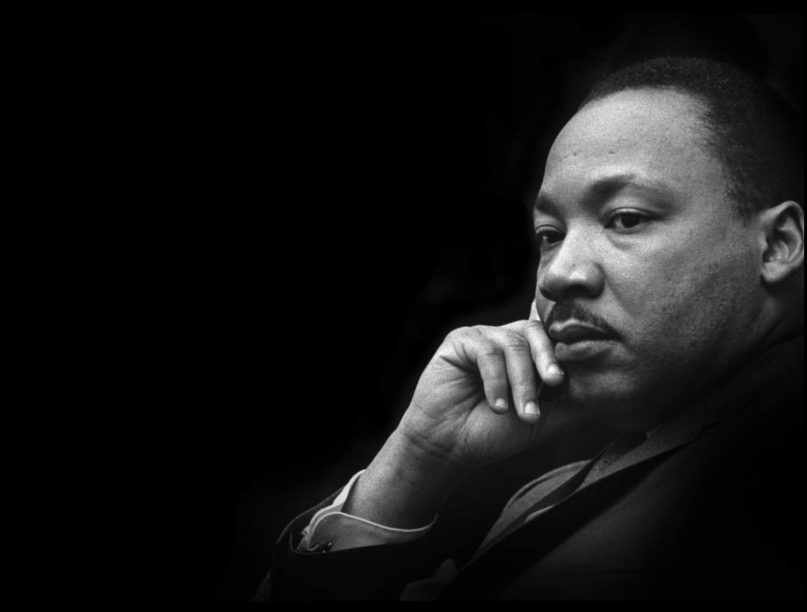
Martin Luther King Jr. made ‘I Have a Dream’-style speech at Worcester synagogue in ’61
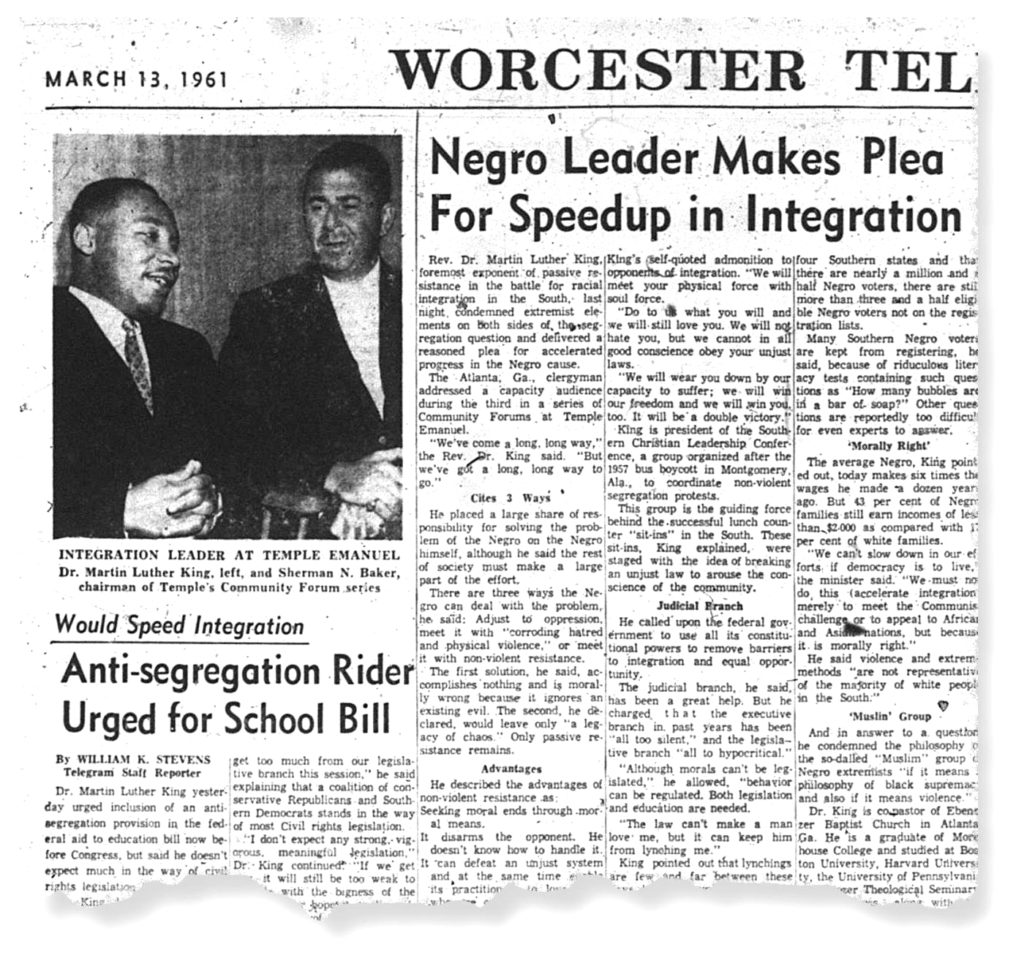
(JTA) – The reel-to-reel recordings of the speech delivered by Rev. Martin Luther King Jr. at Temple Emanuel in Worcester in 1961, were rediscovered in 2013 by Laura Klein-Weiner, the granddaughter of Rabbi Joseph Klein, who invited King to speak there. The speech uses phrases and themes from King’s “I Have a Dream” address delivered two years later in Washington, D.C.
Scholars say the tapes, which have been described as a “historical gem,” show a different side of the civil rights leader.
“I guess I had heard that he had come to the temple, but I didn’t know that the tapes existed,” Klein-Weiner told the Boston public radio station WBUR. “So, I was frustrated to know that there was a piece of history that we were sort of sitting on.”
Klein-Weiner, who lives in the Los Angeles area, took the tapes to Northwestern University to have them digitized and put on compact discs, then uploaded them to Soundcloud, a free audio host website.
A former Worcester resident, Mark Epstein, heard the recording there and set out to have the recordings available to be played in public schools in the Charleston, South Carolina, area where he currently lives, and in Worcester.
In 2018, the recordings were used as part of the Black History Month curriculum for middle and high school classes in the Charleston County School District, Epstein told a local newspaper. They reportedly also found their way into high schools across the country.
In 2018, Tommie Shelby, a professor of African-American studies and philosophy at Harvard, told WBUR that after the hourlong speech, the second hour in which King answered questions on topics including black nationalism, interracial marriage and economic inequality showed another side of him.
“You get a feel for what was often reported by his friends, that he had a great sense of humor, was really good with jokes and quick to make you laugh,” Shelby said. “You don’t always get a feel for that in his speeches, when he’s much more austere and restrained.”
Jewish groups and lawmakers laud legacy of Civil Rights ‘hero’ John Lewis
By Ron Kampeas
WASHINGTON (JTA) – The black-Jewish coalition that has fought for civil rights since the 1960s has the city of Atlanta as its nexus. Folks there cite three reasons for this: a substantial African-American population, a relatively large Jewish community and John Lewis.
Lewis, 79, the longtime Democratic congressman from Georgia who announced Sunday that he was suffering from stage 4 pancreatic cancer, has been close to Jewish groups for decades. And that longstanding relationship was on full display with the reactions from Jewish groups to the Lewis announcement.
“Representative Lewis has been a fighter his entire life, from the dirt-poor farm he grew up on in Alabama, to the long struggle for civil rights and the promise of America for all its inhabitants, to his distinguished service as a member of the U.S. House of Representatives for the past 32 years,” the American Jewish Committee said in a statement Sunday.
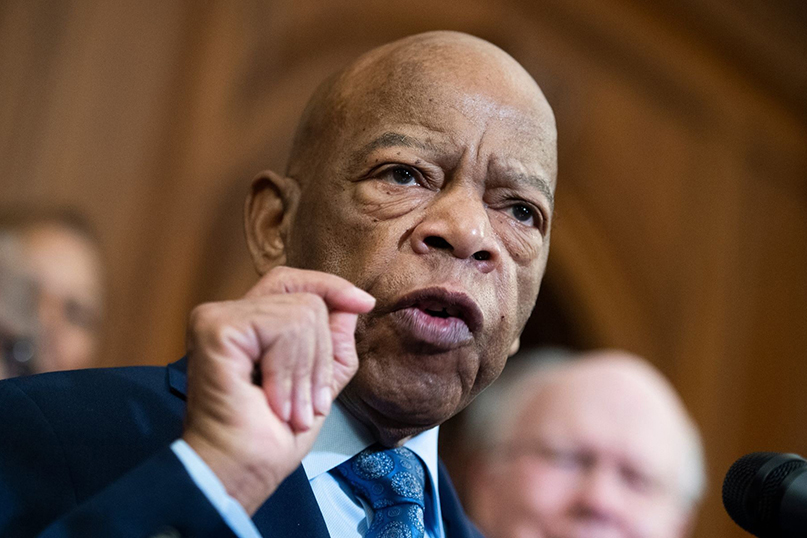
(Tom Williams/CQ-Roll Call, Inc via Getty Images)
Jonathan Greenblatt, the Anti-Defamation League’s CEO, called Lewis “our nation’s moral compass” and said he has “set the standard for righteous pursuit of justice and what is right.”
“This is not an exaggeration: Mr. Lewis has transformed our country through his struggle and leadership,” Greenblatt wrote in an email to the Jewish Telegraphic Agency.
Rep. Steve Cohen, D-Tenn., a Jewish congressman representing a black-majority district in and around Memphis, in a statement called Lewis “a heroic voice of conscience in an era of lessening values. He is America’s saint.” Other Jewish lawmakers praising Lewis included Sen. Dianne Feinstein, D-Calif., and the minority leader in the Senate, Chuck Schumer, a New York Democrat.
Lewis has sought Jews as partners since his days helping to organize the 1963 March on Washington. He and Rabbi Abraham Joshua Heschel were among the leaders of the 1965 March on Selma, and a photo of the two men forming a vanguard with 10 others – including the Rev. Martin Luther King Jr. – has become iconic.
In 2012, speaking at an AJC event at the Democratic National Convention in Charlotte, North Carolina, Lewis showed impatience with the schism that had developed between blacks and Jews in subsequent decades over issues like affirmative action and Israel.
“If we know each other and understand each other, there would not be a schism,” Lewis said.
The AJC was the Jewish organization to which Lewis was the closest. Under its aegis Lewis, then an Atlanta city councilor, co-founded the Atlanta Black-Jewish Coalition in 1982. This year, he gave his blessing to and served as co-chairman of the Congressional Black-Jewish Caucus, which also is an AJC initiative.
Lewis is backing Jon Ossoff, a Jewish U.S. Senate candidate in Georgia hoping to unseat the incumbent Republican, David Perdue, in 2020.
His status as a near martyr of the civil rights movement – police savagely beat him in 1965 in Selma – has elevated Lewis to that increasingly rare creature: a politician beloved on both sides of the aisle.
Kellyanne Conway, the often acerbic aide to President Donald Trump, said on Twitter: “Prayers and comfort for a courageous and timeless civil rights hero.”
Earlier this month, Sen. Johnny Isakson, the Georgia Republican who announced that he was quitting Congress because of Parkinson’s disease, crossed to the House chamber to hear Lewis deliver a tribute. Lewis ended his paean to his colleague by crossing the aisle and embracing him closely, choking up some Republicans in the chamber.
Jewish groups over the years have rallied to Lewis’s causes – and to his defense. The Reform movement, the AJC and the ADL have joined Lewis in making protections for voting rights for minorities a top priority. And in 2017, when Trump attacked Lewis on Twitter as “all talk and no action” after Lewis questioned the legitimacy of his election, all three shot back at the president.
“Wrong! His life has been all action & results. He changed US history,” the AJC said.
Lewis’s legitimacy among Jewish groups has made it hard for them to ignore his criticism. Lewis lent his sponsorship this year to a resolution opposing laws that penalize Israel boycotters – measures supported by both the AJC and the ADL. Lewis did so not because he embraces the Boycott, Divestment and Sanctions movement – he rejects it – but because boycotts were at the heart of the civil rights movement and he sees them as embodying speech freedoms.
In 2015, Lewis was a spokesman for African-American lawmakers who boycotted Israeli Prime Minister Benjamin Netanyahu’s speech to Congress in which Netanyahu vigorously opposed President Barack Obama’s efforts to negotiate a nuclear deal with Iran. The lawmakers saw the speech as a slight against the first black president by then-House Speaker John Boehner, R-Ohio.
“I am saddened that the speaker would threaten this historic position, bipartisan support of our Israeli brothers and sisters, by this action,” Lewis said.
A statement from Lewis’s office on Monday said the congressman would continue to serve in the House while he undergoes treatment. Doctors have given him a “fighting chance,” the statement said.
“I have been in some kind of fight – for freedom, equality, basic human rights – for nearly my entire life,” Lewis said. “I have never faced a fight quite like the one I have now.”
NAACP and ADL announce partnership to educate public officials against hate in New Jersey
By Ben Sales
(JTA) – The most prominent anti-discrimination organizations in the African-American and Jewish communities are partnering to combat hate in New Jersey.
The Anti-Defamation League, which fights antisemitism and bigotry, and the NAACP, which fights racism and discrimination, announced the partnership Thursday. It comes about a month after a shooting in a kosher supermarket in Jersey City that killed four.
The neighborhood where the shooting took place, Greenville, is a largely African-American neighborhood with a growing Jewish community. One of the shooters, who also died in the attack, was once a member of the Black Hebrew Israelites, a movement with certain sects that the ADL defines as hate groups.
There have also been two recent stabbing attacks against Jews in Rockland County, which is adjacent to New Jersey. Overall, according to a press release, both race-based and antisemitic hate crimes in New Jersey have more than doubled since 2016.
“The last few months have been some of the most difficult for the Jewish community in our region in recent memory,” Evan Bernstein, the ADL’s New York/New Jersey regional director, said in a statement. “We are hopeful and confident that our renewed partnership with NAACP will allow our communities to lock arms and stand together against bigotry and those who seek to distract and divide us from the critical work ahead.”
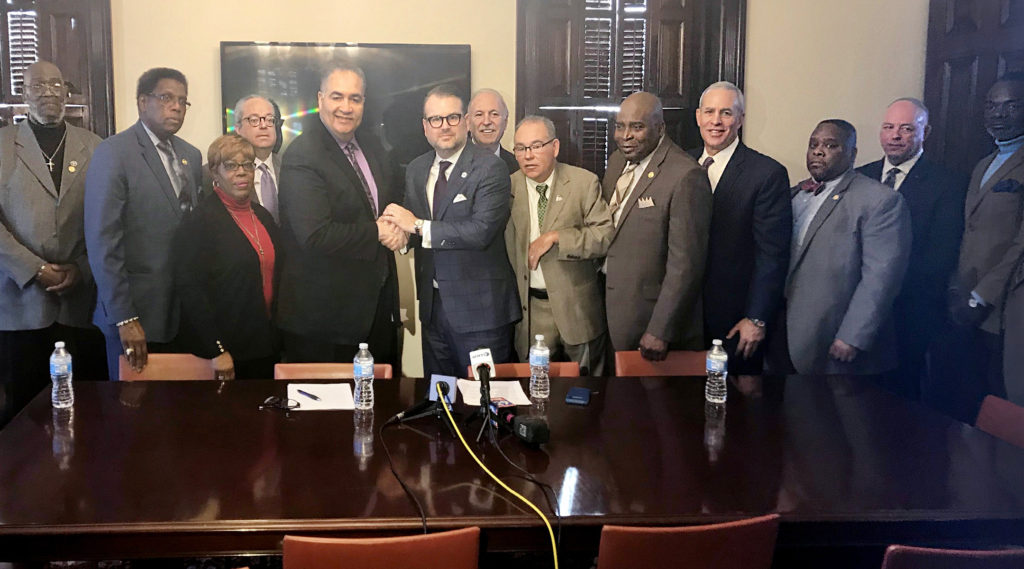
(Courtesy of the ADL)
The New Jersey partnership between the ADL and NAACP has three prongs: collaborating to educate elected officials against hate, hosting a series of listening sessions with constituents of both groups and responding jointly to incidents of hate in the state. The groups have worked together in the past on civil rights, voting rights, criminal justice reform and related issues.
Following the Jersey City shooting, a local school board official, Joan Terrell-Paige, wrote a Facebook comment calling Jews “brutes” and expressing understanding for the shooters. Despite calls for her resignation from local politicians and New Jersey Gov. Phil Murphy, she has remained a member of the city Board of Education after receiving support from Greenville residents and other local officials.
“We stand with our Jewish brothers and sisters in strong condemnation of the acts of hate perpetuated against the Jewish community in our state and in the tri-state area over the last month,” Richard T. Smith, president of the NAACP New Jersey State Conference, said in a statement. “To the Jewish community in New Jersey I want you to know: the NAACP stands with you in this challenging time and in all times.”
African-American teens in Brooklyn have questions about Jews. A Holocaust class provides some answers.
By Josefin Dolsten
BROOKLYN, New York (JTA) – Though Naisha Couamin walks through a heavily Jewish neighborhood near her home in the East Flatbush section of Brooklyn most days, she had never actually talked to a Jewish person until recently.
The 17-year-old had plenty of questions about the Hasidic Jews who were her neighbors. She wondered why they wore distinctive clothing and why the men kept their side locks long. But a sense that the community was insular and concern about the language barrier – many Hasidic Jews in Brooklyn speak Yiddish better than English – kept her from inquiring.
“You always see Jewish people, they always had a secluded area, they were never with other people,” said Couamin. “You see they have their own school bus, their own ambulance, and I always wondered why.”
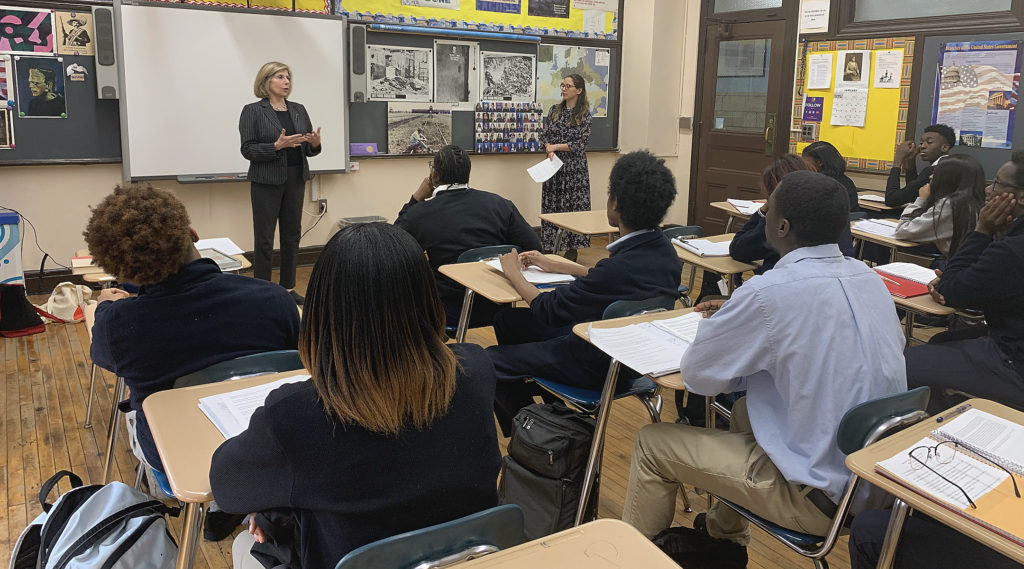
(Josefin Dolsten)
Couamin began to get some answers after enrolling in a Holocaust class at Bishop Loughlin Memorial High School, a majority African-American Catholic school in the Fort Greene section of Brooklyn. The class exposed her to lessons about the history of the Holocaust, including hours of recorded testimony from survivors. But it also gave her a chance to ask questions about Judaism she had never had a chance to before.
“A lot of our students live in Crown Heights and Williamsburg, on the borders of Orthodox Jewish communities, and they notice the friction between the two groups and they don’t understand why,” said William Mason, a social studies teacher who started the Holocaust class five years ago. “So they’ll have a lot of questions about Jewish culture and Jewish ideas.”
The class is a popular one – Mason says it fills up every semester and has a waiting list – and is based on curriculum provided by the Anti-Defamation League and Yad Vashem, Israel’s national Holocaust memorial in Jerusalem. In the spring, students in the class meet a Holocaust survivor in person during a visit to the Museum of Jewish Heritage – A Living Memorial to the Holocaust, in Manhattan.
On Wednesday, the 14 students in the class listened respectfully as Amy Goldberg, the wife of the late Holocaust survivor Ernest Michel, related her husband’s harrowing story of surviving Auschwitz and two death marches. Students heard excerpts from a speech Michel had given in 2012 about witnessing the Kristallnacht riots in his hometown and how his talent with calligraphy helped him survive. Goldberg offered personal anecdotes about what it was like for her husband to cover the Nazi trials at Nuremberg as a journalist and why he refused to cover up his Auschwitz tattoo.
“I used to think that it was really a long time ago and then when I got into this class I was like ‘Oh, there’s people still alive that this happened to,’” said Jermeria Pantoon-Whitehead, 17. “And it made it different for me when I was learning about it.”
Mason doesn’t steer away from discussing recent instances of anti-Semitism, including the attacks on Jews in Brooklyn, Monsey and Jersey City in the last month. Learning about anti-Semitism in the past also helps students feel closer to the Jewish community today, Mason said.
“They relate to that because they’re also subject to all this nonsense that goes on, and you’re no longer at odds. You’re now allies,” he said. “And we talk about the concept of ally, and remind the students during the Civil Rights era, who was the biggest supporter of the African-Americans? The Jews. It was like this from day one, and the kids understand that now.”
Goldberg’s visit was organized by Lindsay Bressman, the director of Civic Spirit, which supports civic education in Jewish and Catholic schools. Bressman believes teaching students about the Holocaust is especially important today.
“This is part of a bigger story,” Bressman said. “And I think it’s important for these students who never learn about that to understand that when Jews see in the news these targeted killings, they think about the Holocaust, they think about the Spanish Inquisition and the many times that thousands of Jews were killed.”
Lessons about the Holocaust also have a personal impact on many students. Nah’eema Walker, 17, says she was inspired by Goldberg’s description of her husband’s ability to enjoy life despite the suffering he endured and having lost most of his family.
“For him to be able to live a life not angry shows a lot of courage and strength,” Walker said. “Because me being African-American and I see what goes on today – it’s not physically happening to me, but sometimes I get angry and I hold on to that anger, and I may judge a random police officer or regular Caucasian people. So for him to be able to live his life with no hatred is amazing.”








 Southern New England Jewish Ledger
Southern New England Jewish Ledger













